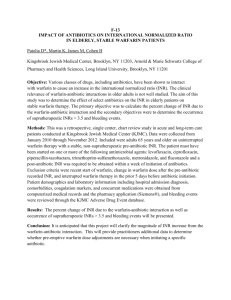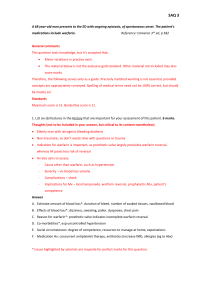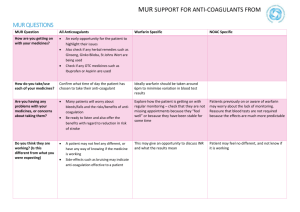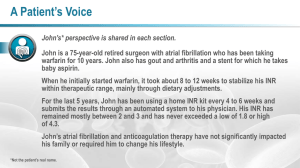Warfarin – High Risk medicine Support Tool
advertisement
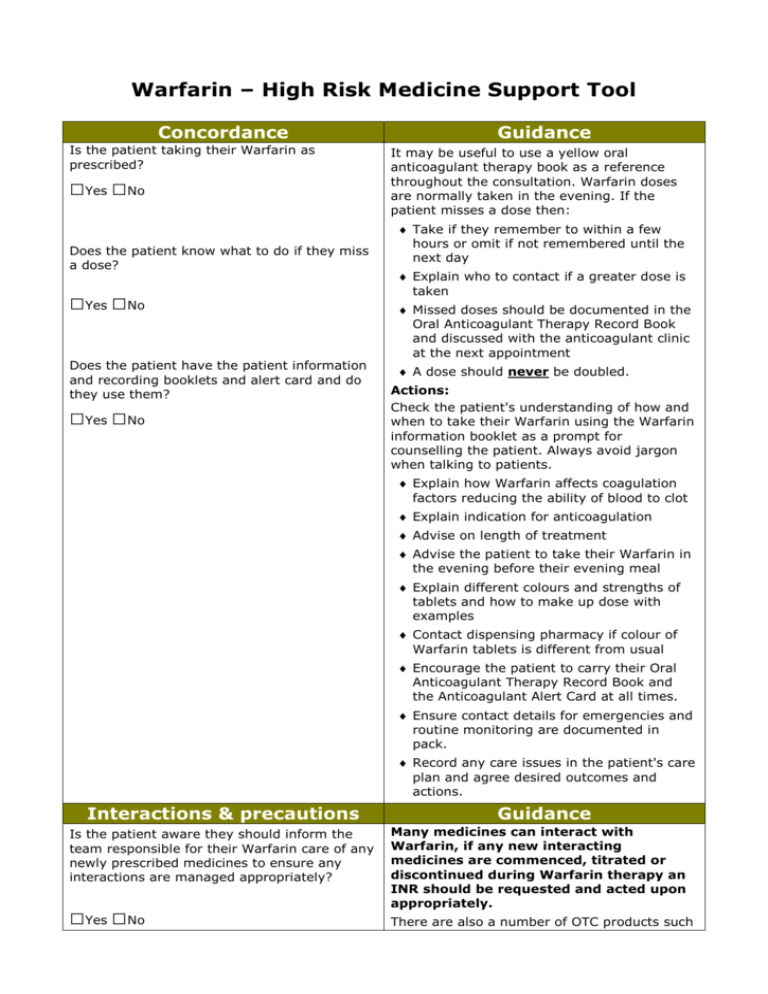
Warfarin – High Risk Medicine Support Tool Concordance Is the patient taking their Warfarin as prescribed? □Yes □No Does the patient know what to do if they miss a dose? □Yes □No Does the patient have the patient information and recording booklets and alert card and do they use them? □Yes □No Guidance It may be useful to use a yellow oral anticoagulant therapy book as a reference throughout the consultation. Warfarin doses are normally taken in the evening. If the patient misses a dose then: Take if they remember to within a few hours or omit if not remembered until the next day Explain who to contact if a greater dose is taken Missed doses should be documented in the Oral Anticoagulant Therapy Record Book and discussed with the anticoagulant clinic at the next appointment A dose should never be doubled. Actions: Check the patient's understanding of how and when to take their Warfarin using the Warfarin information booklet as a prompt for counselling the patient. Always avoid jargon when talking to patients. Explain how Warfarin affects coagulation factors reducing the ability of blood to clot Explain indication for anticoagulation Advise on length of treatment Advise the patient to take their Warfarin in the evening before their evening meal Explain different colours and strengths of tablets and how to make up dose with examples Contact dispensing pharmacy if colour of Warfarin tablets is different from usual Encourage the patient to carry their Oral Anticoagulant Therapy Record Book and the Anticoagulant Alert Card at all times. Ensure contact details for emergencies and routine monitoring are documented in pack. Record any care issues in the patient's care plan and agree desired outcomes and actions. Interactions & precautions Is the patient aware they should inform the team responsible for their Warfarin care of any newly prescribed medicines to ensure any interactions are managed appropriately? □Yes □No Guidance Many medicines can interact with Warfarin, if any new interacting medicines are commenced, titrated or discontinued during Warfarin therapy an INR should be requested and acted upon appropriately. There are also a number of OTC products such Does the patient know that certain OTC medicines (e.g. ibuprofen or miconazole gel) and foods / alcohol can interact with Warfarin? □Yes □No as Daktarin oral Gel and NSAIDs that should be avoided during Warfarin therapy. Actions: Advise the patient to always check with their GP and / or pharmacist that any new medicines, including herbal and OTC medicines, are safe to take with Warfarin. It is good practice to register the patient for the Minor Ailment Service to allow interaction check. Consult with GP if prescribed medication is contra-indicated or high risk of interactions and take appropriate action immediately. Some interactions with Warfarin can affect INR with 48 hours so timely intervention and monitoring are crucial. Record any care issues in the patient's care plan and agree desired outcomes and actions. Explain the importance of a balanced diet and the effect major changes on diet can have on anticoagulant therapy. Inform patient of food and drinks that can affect INR Explain interaction between Warfarin and alcohol and that excessive regular consumption and / or binge drinking can be dangerous. Adverse reactions: side effects and toxicity Guidance Is the patient aware of the common side effects of Warfarin? The most serious side effect of Warfarin is bleeding □Yes □No Actions: Check the patient's understanding of the side effects of Warfarin using the Warfarin information booklet as a prompt. Is the patient aware of the signs of over / under anticoagulation? □Yes □No Is the patient aware what might cause overanticoagulation and how to avoid this happening? □Yes □No Is the patient aware of what to do if they are suffering from these signs? □Yes □No Is the patient aware to whom adverse Refer a patient with any bleeding or bruising to their GP, anticoagulant clinic or directly to A&E. Record any care issues in the patient's care plan and agree desired outcomes and actions. Ensure patient is aware of signs of under anticoagulation e.g. pleuritic chest pain, calf tenderness. Serious side effects include, but are not limited to: Prolonged nose bleeds, more than 10 minutes Blood in vomit Blood in urine or faeces reactions should be reported? □Yes □No Blood in sputum Passing black faeces Severe or spontaneous bruising Unusual headaches Heavy or increased menstrual bleeding or any other vaginal bleeding Monitoring Has the patient had a recent blood test to check their INR? □Yes □No Guidance Warfarin has a narrow therapeutic index. Each time you dispense a prescription for Warfarin you should check that the patient's INR is being monitored regularly. Actions: Explain what INR is and the patient's target range. Explain importance of monitoring and keeping appointments. Explain need to bring record book to appointments / pharmacy. Establish if patient has had recent INR checked. If they have not had their blood levels monitored recently Contact prescriber to request monitoring and advice. Supply their prescription for Warfarin. Record this as a care issue in the patient's care plan and agree desired outcome and actions with patient and GP. Summary Key messages: Always check for interacting medicines and manage accordingly i.e. more frequent INR monitoring and adjustment of dose of Warfarin if appropriate Check if the patient has been educated on Warfarin Check if the patient has Oral Anticoagulant Therapy Pack Check if the patient has a recent INR result Guidance Actions: Any pharmaceutical care issues, desired outcomes and actions to resolve the issues should be agreed with patient and recorded in their care plan. At each future dispensing: Check for monitoring and signs of toxicity Review and update any outstanding care issues in the care plan if appropriate
